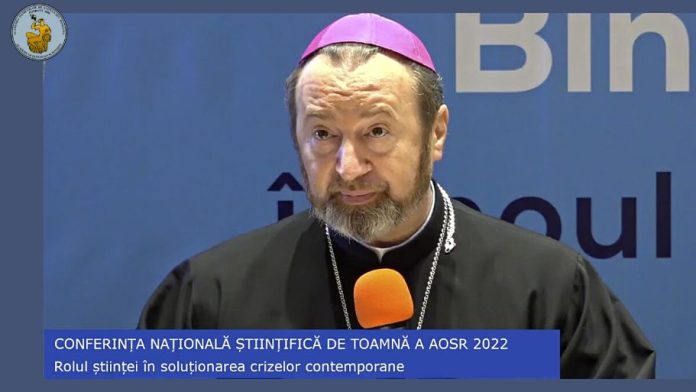Message addressed by Fr Claudiu-Lucian POP, Eparchial Bishop – Greek Catholic Diocese of Cluj-Gherla, at the opening of the AOSR National Autumn Scientific Conference, The role of science in solving contemporary crises 4 November 2022.
Distinguished members of the Academy of Romanian Scientists,
Ladies and gentlemen, professors of the Iuliu Hațieganu University of Medicine and Pharmacy,
Honourable representatives of civil authorities,
Distinguished audience,
“I am honoured to participate in this prestigious event and would like to congratulate the organisers for their inspired choice of theme that will guide the reflections and lectures of these days: The role of science in solving contemporary crises .
The subject is more topical than ever. We have lived through the pandemic crisis, which has shaken the whole of humanity and highlighted the essential role of science in health. The international community is now facing the situation in Ukraine, which has turned into a global crisis, with multiple consequences on everyone’s life: social, economic and cultural. Added to all this are the challenges of climate change and environmental pollution, the environmental crisis, whose negative impact on biodiversity and on our daily lives is obvious. Fortunately, we are seeing a huge effort by scientists to solve these problems: food, sustainable and ecological development, energy and economic mechanisms all depend on the results of scientific research and technological progress.
The role of people who have made their lives in the service of knowledge is therefore of vital importance to society. The researcher strives to know reality more and more deeply, to know the laws and energies of the universe, always with the aim of contributing to the common and personal good of mankind, to the preservation of nature, which, from a Christian perspective, is not the random scene of man’s existence, but his vital space, created and given by God, in which and through which he must achieve and acquire salvation. In other words, knowledge belongs to man and the results of scientific research are meant to humanise society and contribute to the fulfilment of every person.
The 20th and 21st centuries have seen great scientific and technological progress, constantly developing and raising living standards. On the other hand, it was also during this period that humanity experienced the dramas of the two world wars, the Holocaust, the communist camps, an uninterrupted series of conflicts, and the selfish exploitation of resources, i.e. realities that testify to the use of science against life and nature. All of this speaks to the need to constantly combine scientific progress with moral responsibility, both at the personal level of the researcher and at the level of national and international public policy.
The gravity and complexity of the current problems do not admit unilateral solutions, but require the collaboration and moral commitment of all. The Holy Father Pope Francis, referring to the environmental crisis, said: “It is also necessary to have recourse to the various cultural riches of peoples, to art and poetry, to the interior life and spirituality. If we really want to build an ecology that allows us to repair all that we have destroyed, then no branch of the sciences and no form of wisdom can be neglected, not even the religious one with its own language”(Laudato si, 23).
The alliance between faith and reason, between the Gospel and science, can continue to demonstrate its fruitfulness. While science opens man’s understanding of the world’s immanence, faith gives him the perspective of transcendence and the horizon of God’s presence. Both capture constitutive dimensions of reality, both converge in the search for truth and the achievement of good. Christian faith and science, together with art, transcend all political or ideological boundaries and their encounter is value-generating and hope-inspiring.
Being in the premises of the University of Medicine and Pharmacy in Cluj-Napoca, where freedom of research and scientific excellence are put at the service of man, we cannot help but notice that this university institution bears the name of Iuliu Hațieganu. It is worth remembering that the illustrious doctor, professor and rector, son of the Greek-Catholic Church, former classmate at the Gymnasium of Blaj with the Blessed Cardinal Iuliu Hossu, but also an exceptional exponent of the medical school of Cluj, launched an appeal in his time that has survived to this day: Keep alive the flame of science and conscience!
Thank you!”


